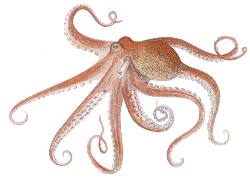Un interesante artículo que debate sobre los procesos de aprendizaje del pulpo.
Octopuses are Smart Suckers!?
Dr. Jennifer Mather, Department of Psychology and Neuroscience, University of Lethbridge and Roland C. Anderson, The Seattle Aquarium
The same question about octopus behavior intrigued both authors, though at different places and from different backgrounds. While watching an Octopus vulgaris in Bermuda, the first author observed it sitting in its sheltering den after a foraging expedition, where it caught several crabs, took them home and ate them. Suddenly it jetted out directly to a small rock about two meters away, tucked it under its spread arms and jetted back. Going out three times more in different directions, it took up three more rocks and piled the resulting barrier in front of the entrance to its den. It held them in front with several arms and went to sleep. This didn't look like random action, but planning. The second author came in one morning to the Aquarium to find one of the giant Pacific octopuses had been busy overnight. The gravel on the tank bottom was dug up, the nylon cable ties that attached the undergravel filter to the tank had been bitten through and the detached filter had been bitten or torn into small pieces, which now floated on the water surface (experienced octopus keepers know that Murphy's Laws seem to apply especially to octopuses!). Again, this looked like a careful sequencing/planning of actions and learning put to use, though the reasons weren't at all obvious. These observations made both of us believe that octopuses could possibly be intelligent and use their intelligence for unexpected purposes.
When humans think of intelligence, we think of ourselves. This anthropocentric viewpoint is partly because intelligence has only really been studied in vertebrates and partly because we see its evolution as leading to the pinnacle called Homo sapiens. Until recently, there hasn't been any model of how another completely separate group could show us how intelligence might evolve differently than ours. Research on the octopuses is beginning to provide that alternate model.
An octopus is very different from a mammal. It only lives about two years. It has much less opportunity to gain and use intelligence than an elephant, which has a 50 year lifespan and three generations of a family to lead and learn from. Still, bees learn about flower locations from other bees, and they live only a few weeks as adults. However, an octopus is also not social; Humphrey (1976) suggested that intelligence has evolved to solve social dilemmas. The young octopus learns on its own with minimal contact with conspecifics and no influences of parental care or sibling rivalry. However, the octopus has a large brain with vertical and sub-frontal lobes dedicated just to storing learned information (Wells, 1978): it has the anatomy for a robust, built-in intelligence.
But, it is not enough to know that the anatomy predicts an animal to be intelligent without some idea of how it uses this ability. Investigations at Naples in the 1950s and 1960s found that octopuses (or "octopi", if you want to Get Latin!!) can learn a wide array of visual patterns, encoding information mostly by comparing edges, orientations and shapes. They also learned by touch, and tactile information seemed to be stored in a different brain area than visual. Intent on just demonstrating learning abilities at first, researchers did not follow up to find what octopuses were doing with this learning in their ocean home. As ethology's (i.e., the ethical or "moral" side of science, which discourages direct experimentation on intelligent animals) emphasis on observation of natural behavior in the field began to fill the gap (see Lehner, 1998), the Naples studies ended, and no linkage was made between abstract information storage and the use of learning in daily life. Finally, this gap is being bridged by such works as Hanlon and Messenger (1996), who provide an overview of cephalopod behavior. But, even asking the right questions about octopus intelligence is difficult, since we understand so little of their minds. Watching an animal and wondering how it is organizing its world, then testing it to see if your guesses have some foundation—that is very difficult indeed! Still, we are starting to get some answers both by observing in the field and by studying areas such as prey manipulation, personality and play (yes, play!) in the octopus.
One of the insights into how we might view octopus intelligence came for the first author when reading Neisser's (1976) definition of cognition (i.e, thinking) as "all the processes by which sensory input is transformed, reduced, elaborated, stored, recovered and used." It seemed a focal issue: what were octopuses in the ocean doing with the information that learning studies said they could acquire? One study we undertook centered on what we came to call the "Packaging Problem". The problem posed was how an octopus could utilize a delectable clam enclosed in its hard shell, to get at the soft, delectable clam body. This is the end result of what Vermeij (1993) called an "evolutionary arms race": many predators evolved means of penetrating the hard shell the clam uses to protect itself, which is held together by powerful muscles—sea stars pull the valves apart, oyster-catcher birds pry them apart, moon snails (Naticidae) drill a hole into the shell, and gulls drop the clam from a carefully calculated height onto rocks or road pavement. But the octopus goes these predators one better: it can use several different strategies to solve this Packaging Problem, instead of just one or two! (...)
El artículo entero se encuentra The Cephalopod Page
Labels: Comportamiento




0 Responses to “Aprendizaje de los pulpos”
Leave a Reply